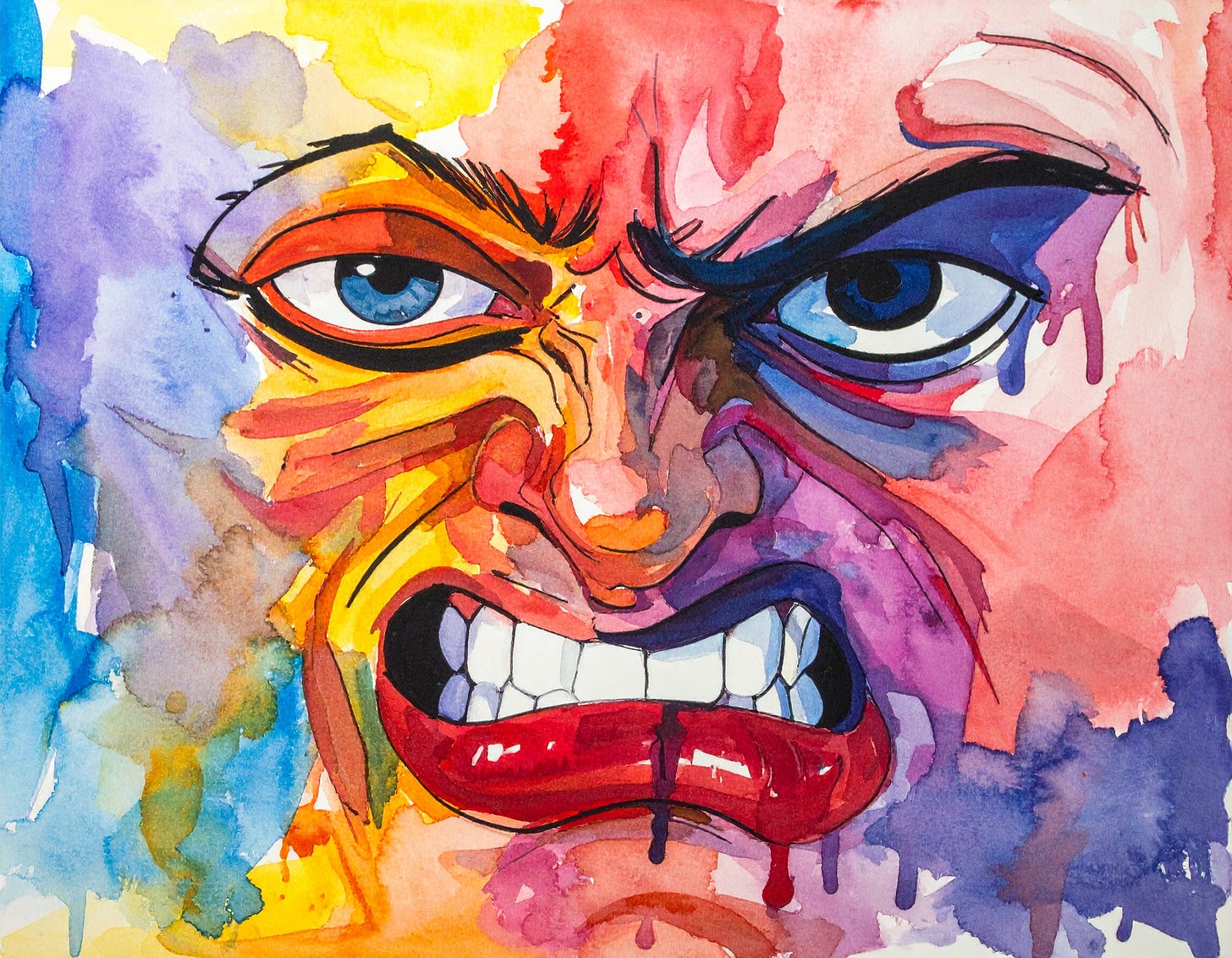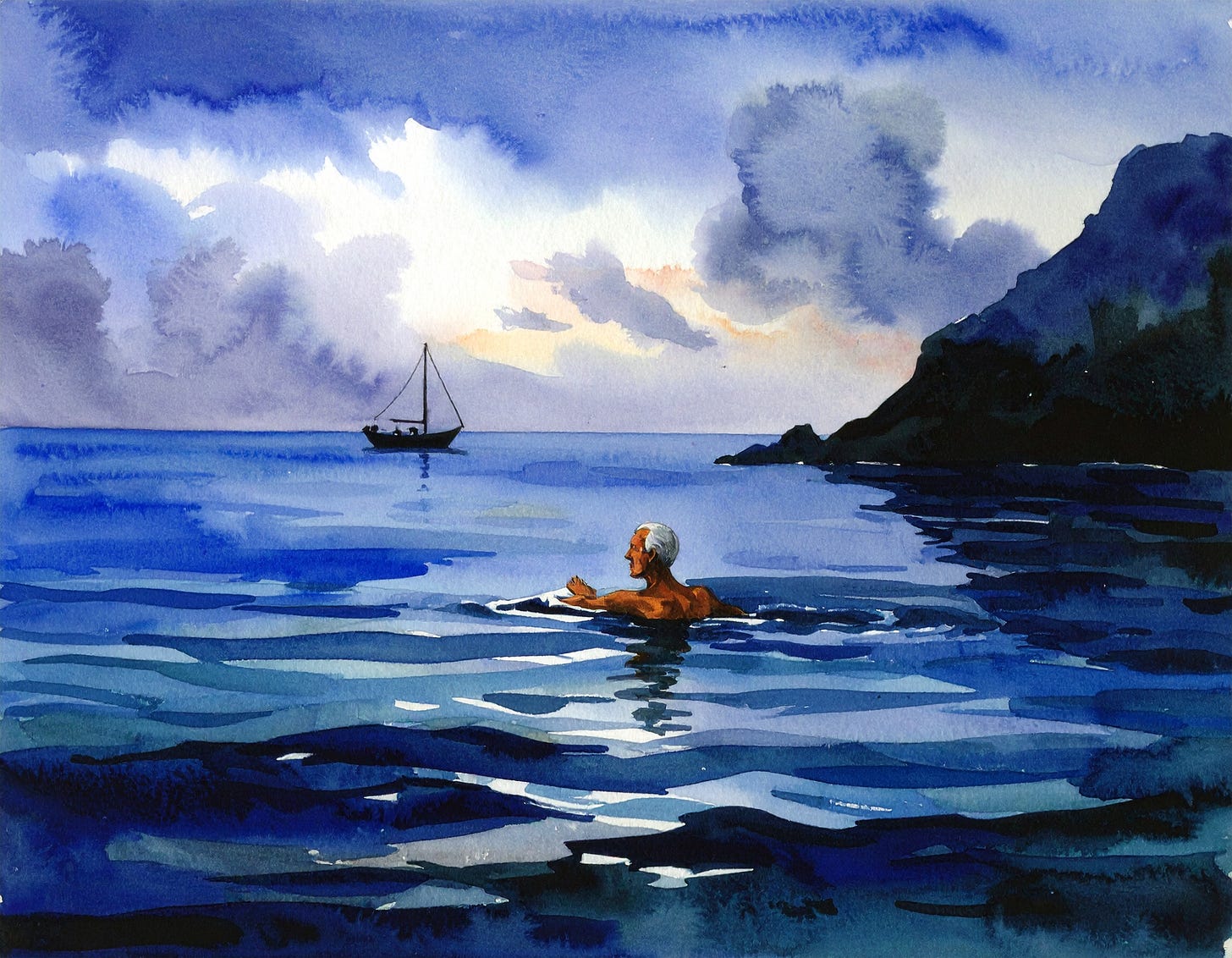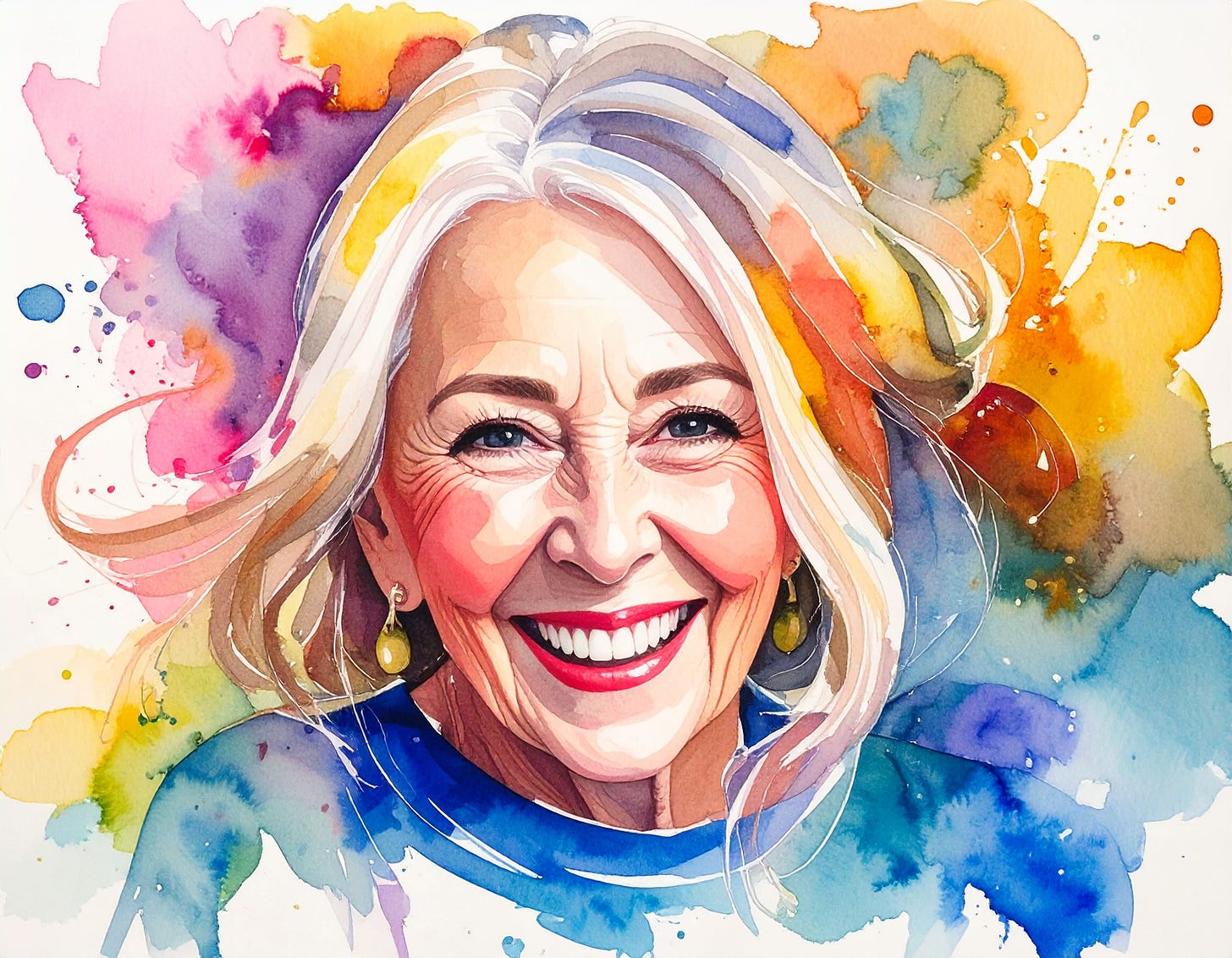[Issue #44] The Shadow Side of Joy
Why happiness, peace and joy can be difficult emotions to navigate
I’m Not Triggered is on YouTube! Watch this episode here!
"The present was an egg laid by the past that had the future inside its shell."
-Zora Neale Hurston
My heart pounds as I sit down to join my family for game night. The room's warmth, its embrace - this is the home I’ve made my own, after all - should be comforting. But with each passing second, tick, tick, tick, my anxiety builds. And builds. I start looking (unbeknownst to my conscious brain) looking for any indication of a threat, impending disaster. Laughter, smiling faces, the loud crinkle of the chip bag and the snapping of the cards as the pieces hit the board and the dice scatter, and…they all feel like precursors to a shattering moment. There's a terror in joy, a horror in happiness, a fear that comes with surrendering to the vulnerability required for true connection.
And it’s not just game night that pulls at my inner threads so wildly. It’s intimacy at its core. In the arms of my wife, I feel a love so profound it scares me. But as she wraps her arms around me every morning, her hair still asleep and her eyes so vibrant I can’t help but smile when I see her, sometimes I can easily and quickly feel myself pushing her away. Not physically (though, I do that to people I don’t know well or feel comfortable with), but with my wife, I push her out emotionally by building walls (and backing her into emotional corners). These walls are steel and they’re 9 inches thick. These walls are built out of fear. My fear is not of her but of the love she's offering.
No one told me love like this would be so difficult to feel, let alone embrace. Love is a raw, uncensored emotion that demands vulnerability, and that's terrifying.
Why?
Trauma and pain teach us to expect the worst. The shadows of past experiences linger like ghosts, whispering words of despair and echoing the false narrative of unworthiness. When happiness knocks, I flinch while my trauma gets busy smothering my joy under a mountain of fear. Smothering out the vibrancy of my life, my relationships, my heart.
In her book, “How Emotions Are Made”, author Lisa Feldman Barrett argues that complex trauma and the anxiety which results are at least partially at fault for my incredible, ungraceful response to joy, love, and happiness:
“…[Anxiety] is yet another disorder of prediction and prediction error across [the interoceptive and control] networks.
…Anxiety sufferers…have weakened connections between several key hubs in the interoceptive network…These weakened connections likely translate into an anxious brain that is clumsy at crafting predictions to match the immediate circumstance. You might predict threats needlessly, or create uncertainty by predicting imprecisely or not at all…And uncertainty is more unpleasant and arousing than assured harm, because if the future is a mystery, you can’t prepare for it.”
Oh. Well, that makes some kind of sense, doesn’t it?
Of course my body is literally freaking out, in fight, flight, freeze mode. And I know myself well enough to say, 9 times out of 10, my response is fight. Knowing this, in the heat of an angry spout, for instance, I tend to count to 10 or walk away when I feel overwhelmed by anger, or sadness, or shame, or…
But, to just walk away when someone offers love, or to disengage and be alone in a dark basement with my imagination, these thoughtless reactions to emotional distress actually send the exact opposite message of what I actually want. What I actually need.
In her groundbreaking (and incredibly gorgeous) book titled “Atlas of the Heart”, Dr. Brené Brown has coined the dichotomy of fear and happiness as “foreboding joy”, which she defines thusly:
“Foreboding joy is one of those practically universal experiences that everyone thinks of as something only they do. A few people don’t experience it, but most of us do. And when it comes to parents…95 percent of the parents we interviewed experienced foreboding joy with their children.
When we lose our tolerance for vulnerability, joy becomes foreboding. No emotion is more frightening than joy, because we believe if we allow ourselves to feel joy, we are inviting disaster. We start dress-rehearsing tragedy in the best moments of our lives in order to stop vulnerability from beating us to the punch. We are terrified of being blindsided by pain, so we practice tragedy and trauma…”
This is what foreboding joy does; it robs us of happiness under the guise of practicality, convincing us that we will be unprepared for life’s pain if we're busy being happy. Or, if we’re happy, we’ll be the foolish ones because obviously all happiness leads to incredible pain.
I’ve believed this for about 36 years, give or take. To allow myself to feel joy, to invite in love, to ask for what I need, means giving up my defenses. And then I have to assess if giving up my security is worth a potential implosion. Because, to love is to get hurt. To feel happiness is to feel sadness. To feel peace is to feel turbulence. And that also means causing pain to others, and sometimes, ourselves, unintentionally.
But let’s back up.
So what is joy, really? Philosophers and psychologists offer nuanced perspectives. Freud viewed it as a release of tensions. According to Csikszentmihalyi, joy is experienced when we are fully absorbed in activities that challenge but do not exceed our abilities. In a Huffpost article, Dr. Brené Brown covers joy like this:
”Joy is the most vulnerable emotion we experience…And if you cannot tolerate joy, what you do is you start dress rehearsing tragedy."
Joy is often thought to be sheer positivity, but not everything that should be joyous is. It's like being at a party and being the only person not laughing at a joke you don't understand. You're supposed to be happy, but all you feel is alienation. Dr. Brené Brown has coined this foreboding joy:
”It's the fear that comes when we believe that letting ourselves feel joy will lead to something bad happening.”
But, why does this happen?
In his book, “Jewish Tales of Mystic Joy,” author Yitzhak Buxbaum tells the following story (“Rabbi Bunim used to tell this story and conclude, “See the power of joy!” (Buxbaum, 2002, pp. 226–227)):
“[A certain individual] slipped and fell into the swift current of the surging river. Another moment and he would drown. Everyone panicked, and they were all crying out in terror, “Save him, save him!” And they were all astonished to hear Rabbi Bunim cry out to the drowning man, “Give my regards to Leviathan” – the legendary giant fish! The drowning man, who had lost hope of fighting the current, heard him and suddenly began to struggle again to save himself.
Why? Because the rabbi’s levity snatched him out of his despair and aroused his will to live. He finally found a floating plank that had been cast out from a passing ship and held on to it until he was able to get back safely to shore. There was a big crowd on the shore, but the man went straight to Rabbi Bunim and fell on his neck, saying, “You saved my life! If it wasn’t for your clever words, I would have died because of my despair and the confusion I was in because of everyone’s screams. But your joke aroused my will to live; because of you, I’m alive . . . ”
Much like the Jewish tale above, there is a popular little story that captures the same essence:
”A man was lost in the ocean, scared of drowning. He asked God for help. When a fishing boat came by, the man was too wrapped up in trying to survive that he missed the boat and he drowned.”
The point is, if we’re too busy inside our heads, or “living” a life of mere survival (which isn’t truly living), we’re robbed of many, many instances where joy, love, gratitude, and connectedness could bloom. We’ve robbed ourselves of chances to get to know who we are, authentically, without our emotions smearing our perspective. We steal time from ourselves because we’re overthinking when we only have some of the information and we voluntarily give up hours and hours to worrying about outcomes we can’t control (and will likely never come to pass, anyway).
We spend years of our lives searching for the bad apples, looking for the untrustworthy and untrusting. We spend years believing the world is a terrible place, that all humans are awful, that we don’t deserve love or kindness, or we believe we know what love is (and we actually have a limited, or unhealthy, idea).
But, what if we slowed down, even for a moment, to assess how much joy we truly feel, in our hearts and in our bodies? What if we spent less time overthinking and more time creating, or communing with nature? What if we decided to stop doing that thing we’ve wanted to quit doing for a long time but haven’t believed we’re worthy of the positive benefits of quitting, of doing something differently?
Happiness, joy, love, and gratitude are not feelings or states of being only for “positive thinkers” or “outliers” or “everyone but me.” Happiness, joy, compassion - much like guilt, sadness, anger, and embarrassment - are all part of being a real, living authentic human.
We can feel joy and love without waiting for the other shoe to drop. We deserve to feel all of our emotions, without fear. To do that, we have to understand, and accept, that joy, happiness, contentedness all flow in and out all the time. No emotion is permanent and no one is too depressed or too angry to feel (or be worthy of) feeling joy, happiness, love. We can even learn to feel joy at the same exact moment in which we feel guilt.
I’ve learned that breaking free from the mis-guided beliefs that keep me thinking I’m not capable or worthy of happiness or love demands courage and resilience and a lot of tenacity. It means standing at the edge of anything comfortable - looking into the deepest parts of my Self, of my fears, and then taking a leap of faith into the unknown - because I know there’s a better way to live.
“Some cause happiness wherever they go; others whenever they go.”
-Oscar Wilde



